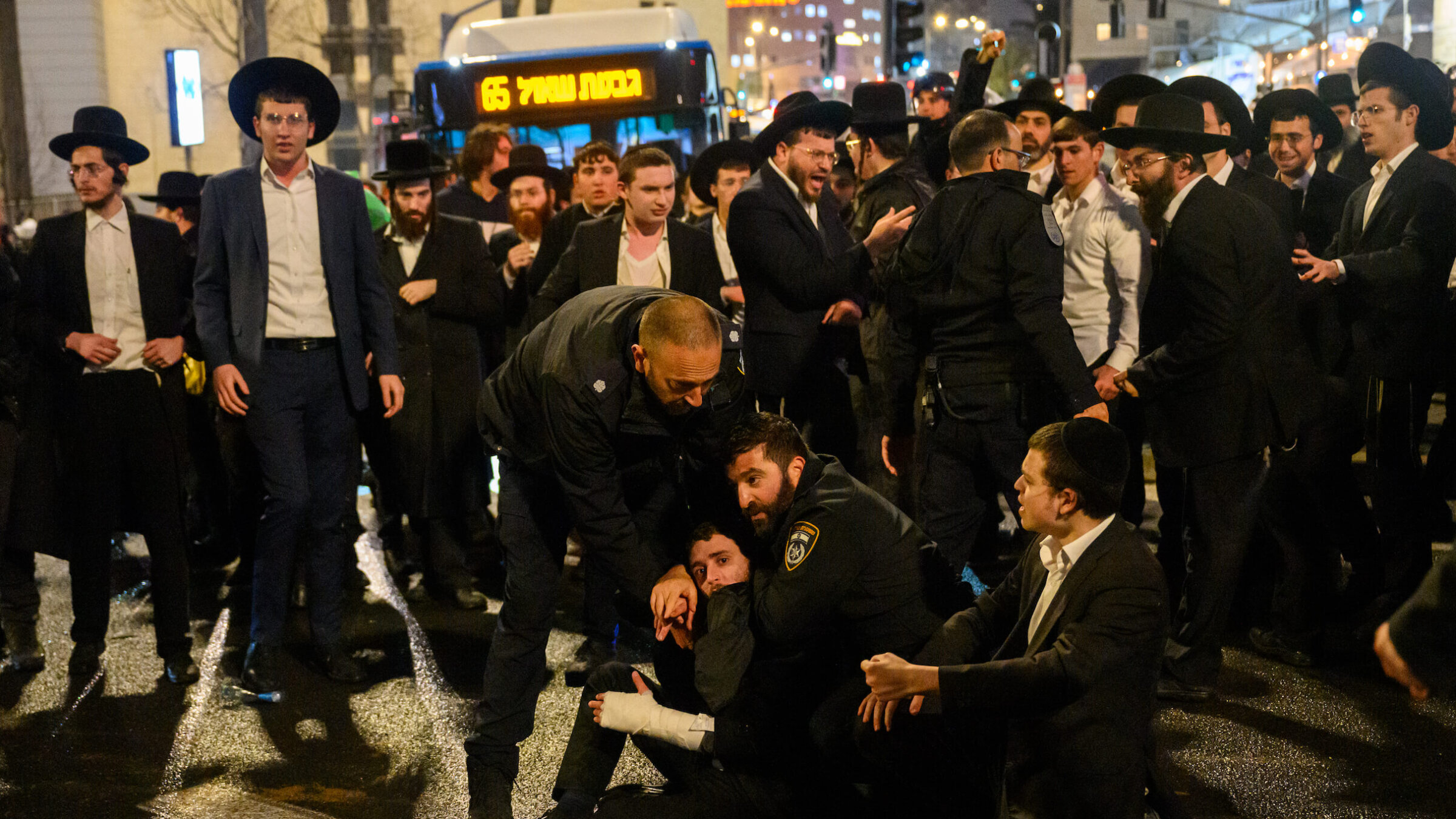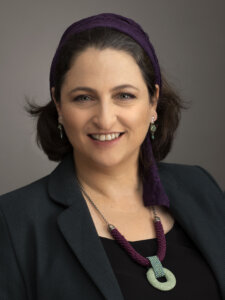‘An earthquake in Israel’: An Israeli expert discusses the end of the Haredi draft exemption
Netanyahu has to get warring factions to compromise on a plan to recruit yeshiva students to the military

Haredi Jewish boys and men clashed with police in March while protesting against the expiration of a law preventing them from being drafted into the IDF. Photo by Alexi J. Rosenfeld/Getty Images
TEL AVIV — Shlomit Ravitsky Tur-Paz has spent years studying how religion and state intersect in Israel. She has argued before religious courts on the issues of marriage, conversation and divorce, and has lately been advocating in the Knesset for the drafting of Haredi yeshiva students to make army service more equitable.
Israel’s High Court of Justice last week ordered an end to the broad draft exemption for Haredim that has been a staple of society since the Jewish State’s founding in 1948. Six months into Israel’s war with Hamas, the policy change presents the most potent threat to Prime Minister Benjamin Netanyahu’s governing coalition.
“This is an earthquake in Israel,” Ravitsky Tur-Paz told me. With 30 days to reach a compromise between Orthodox leaders who rely on the exemption and nationalist parties that oppose it, she predicted: “One of two things will happen. The court could grant the government an extension — or the government will fall.”
The court order is expected to halt about $148 million in annual subsidies to Haredi yeshivas, the first time the country has nixed such a major entitlement for the fastest growing and poorest segment of its Jewish population. It also could make thousands of young Haredi men enrolled in those yeshivas subject to the draft, immediately.
Military officials did not respond to inquiries on Tuesday regarding a report in the Hebrew news site Walla that some Haredim had received draft notices on Monday, when the exemption expired.
Ravitsky Tur-Paz and I spoke on Monday about the implications of the court order and the historical and political context for it. Excerpts of our conversation are below, edited for length and clarity.

Controversy around the Haredi draft exemption dates back to 1948, and the policy has been litigated and legislated for decades. Why is it coming to a head now?
Legally, the court ruled in 2017 that the law enabling it was unfair to the secular majority, and a long series of extensions by the government and the courts ever since finally expired on Monday.
In terms of public opinion, Israelis are increasingly against the exemption, especially during this war, as soldiers are losing their lives and getting wounded. The army needs more soldiers fighting and has issued an emergency recruitment order extending the amount of time enlisted soldiers and reserve soldiers are required to serve. In that context, it no longer seems fair to the general public that Haredim still are getting exemptions. The Israeli people are so angry, they want a solution, they demand it. It’s not only secular people, it’s also religious people – modern Orthodox – who can’t take it anymore.
And demographically, of course, our society is changing. The Haredim are 14% of the population. But because they are a very young sector that has more than six births per woman at a young age, they’re growing by 4% yearly and doubling in population every 17 years – compared to the non-ultra-Orthodox Jewish population, which doubles only every 80 years. Those numbers make it no longer possible for Israel to keep saying they can sit in the yeshivot and not go to the army.
There’s another factor, too, and it’s inside the ultra-Orthodox community. Not all the people, and not the leadership, but some people in the community don’t necessarily feel well with the fact that there’s a war and they are not helping to fight.
There are more than 156,000 Haredi men in Israel whose Torah studies are subsidized by the state. How many of them could be affected by the ruling?
The number we have is 66,784. Those are the ones who are of draft age, between 18 to 26 years old, and have been getting free passes from the army every year to keep deferring their recruitment.
How has their status changed because of the court order?
Each month, those free passes not to serve in the army will expire and not be renewed because there is no longer a legal basis to keep exempting them. So the government subsidies each student has been getting to study Torah, those subsidies have been passed through their yeshivot, and they will stop.
This is an earthquake in Israel.
How might those yeshiva students’ lives change?
It’s hard to tell how much money their yeshivot have on hand to keep funding them without help from the government. Also, the great rabbis are trying to raise money from ultra-Orthodox American Jews to keep the payments coming despite the order.
That private money may help for a month or several months, but ultimately won’t be enough to make up for what some yeshivot were getting from our government. So over the long term studying Torah full time won’t make sense for most of them financially.
What happens next politically and legislatively?
Well, the government has 30 days, until the end of April, to show the court its compromise plan. Coming up with that plan will be tricky because it needs to strike a balance politically within the government, but also needs to be acceptable, legally, to the court.
By legally acceptable, I mean that the court needs to see that there isn’t excessive damage to the principle of equality among Israeli population groups, and that the proposal slowly changes the special treatment Haredim receive. It also needs to have specific, numeric goals for recruiting Haredim into the army that Netanyahu’s government cannot change. And it has to have real economic sanctions for yeshivot that are not sending enough students to get drafted if those goals aren’t met.

Which young Haredi men are they most likely to recruit?
There are a few options on the table. One is to recruit youngsters who aren’t actually learning much, or who attend what we call “soft-yeshivot,” where they aren’t studying Torah all day. Losing them to the army might be easier for Haredi leaders to swallow, even though the community wants to keep them close and not lose them to secular society.
Another is to recruit yeshiva students who are already married, because they’re already firmly inside the ultra-Orthodox society with a wife and maybe kids, so there’s less of a risk that they’ll go to the army and be drawn to modern ways of living and thinking.
It’s still in question who would decide which young men in a community would be drafted and which could stay at yeshivot. Would the chief rabbinate set up some sort of exam to determine who are the best students and who aren’t so they should go to the army? Would there be a lottery? Would the institutions decide?
Also, there is a committee, headed by the former commander of the Air Force, talking about how to address concerns in the ultra-Orthodox community that serving in the army will allow them to maintain their way of life.
They’re talking about how big is the group of ultra-Orthodox people that should serve together. Should we respect their need to be separated from women? How do we deal with their demands to be a separate body with separate laws, but one army? How do you give them the option of still keeping their faith?
Do you expect Netanyahu’s coalition can reach an agreement by April 30?
I don’t think so. The ultra-Orthodox parties are saying “No” to everything. Those Haredi leaders are listening to rabbis. So we need the rabbis to say it’s OK, but that will probably take more than a month. I expect whatever they can agree to politically by April 30 will be too shallow and not agreeable for the court.
So one of two things will happen. The court could grant the government an extension — or the government will fall. It’s a question of how much patience the court will have because it wants the government, not the court itself, to be setting this policy. The court wants to end the long game of ping-pong on this issue.






















